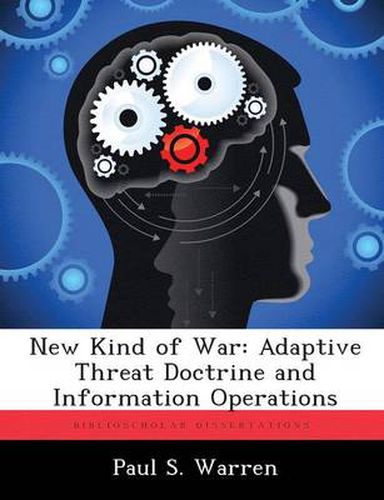New Kind of War: Adaptive Threat Doctrine and Information Operations
Paul S Warren

New Kind of War: Adaptive Threat Doctrine and Information Operations
Paul S Warren
This title is printed to order. This book may have been self-published. If so, we cannot guarantee the quality of the content. In the main most books will have gone through the editing process however some may not. We therefore suggest that you be aware of this before ordering this book. If in doubt check either the author or publisher’s details as we are unable to accept any returns unless they are faulty. Please contact us if you have any questions.
The United States military remains the dominant post-modern state combatant. Military actions in Kosovo, Bosnia, and the Desert Storm victory validated the theory that information-based technologies are decisive factors in modern military operations. Threats recognize that peer competitors of the U.S. do not exist and are several decades away from developing similar military technologies. Consequently, threat-based strategies seek alternative or asymmetrical methods of warfare designed to exploit U.S. weaknesses and disrupt or paralyze the decision-making apparatus. Information operations provide opportunities to avoid direct contact with superior conventional forces and threat capabilities enhanced where qualitative gaps with opposing forces exist. The theoretical framework for the study is a model of information warfare that draws a distinction between cyberwar and netwar two components of information warfare that are structurally different. Using a hybrid of this model, the effectiveness of threat strategy using netwar to disrupt the decision-making process and create paralysis at the strategic and operational level can be determined. Understanding how the threat is adapting to knowledge-based warfare and U.S. military information dominance is vital to U.S. national interests. What methods are state and non-state actors using to counter U.S. technological superiority? Can adaptive threat applications be developed that cause strategic and operational paralysis? If so, then are they successful in achieving threat end-states and are they designed to use information operations to gain a relative advantage? Can it be shown that future threats to the security of the United States can develop new ways, specifically netwar strategies, to attack and exploit U.S. military weaknesses? Conclusively, threats to the security of the United States and her allies might achieve the operational and strategic paralysis of U.S. and allied military forces through netwar stra
This item is not currently in-stock. It can be ordered online and is expected to ship in 7-14 days
Our stock data is updated periodically, and availability may change throughout the day for in-demand items. Please call the relevant shop for the most current stock information. Prices are subject to change without notice.
Sign in or become a Readings Member to add this title to a wishlist.


